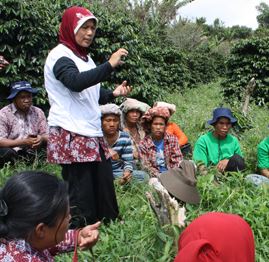IFC, ECOM Training Helps Women Farmers Boost Income, Productivity
 Women make up 80 percent of coffee farmers in North Sumatra of Indonesia and 50 percent in Lam Dong of Vietnam. The coffee beans that they grow can change their families’ lives. IFC’s partnership with global coffee trader ECOM Agroindustrial has been teaching these female entrepreneurs farming techniques that boost productivity and family incomes.
Women make up 80 percent of coffee farmers in North Sumatra of Indonesia and 50 percent in Lam Dong of Vietnam. The coffee beans that they grow can change their families’ lives. IFC’s partnership with global coffee trader ECOM Agroindustrial has been teaching these female entrepreneurs farming techniques that boost productivity and family incomes.
IFC and ECOM have employed women trainers and sought out volunteers to engage leaders from unions and farmers’ associations. The training schedules accommodate the needs of students and IFC is also providing a simple financial management tool to help these women manage household income and farm expenditures.
“The training has not only taught me about good farming practices, but also about financial management,” said Mrs. Susanti, a coffee farmer in North Sumatra. She has been receiving training for the last three years. “Now, I can better manage my family and farming expenses. I have three grown children and they all go to college. It’s all because of coffee farming.”
Supporting Women in Agribusiness is Good for Business
As a result of IFC and ECOM’s work, the percentage of Indonesian women who received agricultural training in North Sumatra jumped to 27 percent – about 1,600 women – from 4 percent in 2009. In Lam Dong, the percentage of Vietnamese women farmers more than doubled to 25 percent, or more than 2,300 women, from 12 percent in 2010.
“The training has not only taught me about good farming practices, but also about financial management.”
“This initiative makes us realize that providing women with the right agricultural practices can help us improve crop yield and the quality of the beans,” said Amran Sinaga, head of the Agriculture Office of North Sumatra’s Simalungun district.
In Indonesia, an IFC survey found that the productivity of farmers training groups comprising both men and women rose 102 percent.
“Empowering women in key sectors such as agribusiness has been one of IFC’s strategic focus areas,” said Sérgio Pimenta, IFC Director for East Asia and the Pacific. “When women farmers have better access to technical training, they will adopt good agricultural practices, improve their productivity and manage their household incomes better.”
You may have an interest in also reading…
European Commission: Helping SMEs Seize Global Opportunities
The priority for Europe now is to overcome the crisis boosting competitiveness and growth. Fast growing emerging markets such as
Pioneering, Principled and Passionate Champion of UAE’s Natural Heritage
Her aim is for sustainability and balance Her Excellency Dr Shaikha Salem Al Dhaheri, the Secretary General of the Environment
Demand for Sustainable Developments Rises as UAE Residents Vote for a Greener Lifestyle
Emaar Community Management showcases latest initiatives at Cityscape Global Dubai, UAE, 1 September 2014: Emaar’s Community Management programme will be at


















































































